Old Blog 2013-2019
Roy’s Old Blog 2013-2019
(20) June 2019: Trillion dollar question
Letter sent to The Guardian
Philip Hammond’s widely criticised letter to Theresa May explains that a net-zero carbon target will cost the UK £1 trillion pounds. There is an easy way to check on the Chancellor’s pronouncement. All that is necessary is to multiply three numbers together…
(19) Oct 2018: Scotland’s energy trilemma
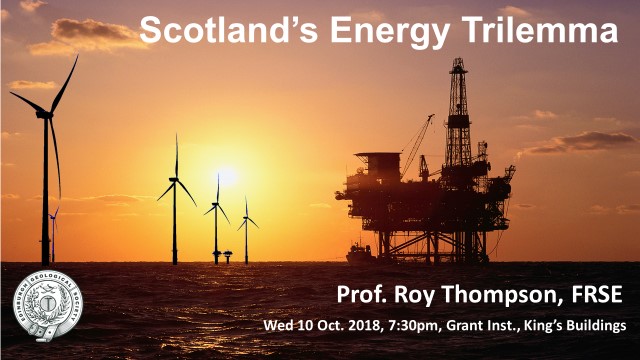
pdf of Edin. Geol. Soc. lecture
Synopsis:
The energy trilemma is the problem of striking a balance between costs, security and environmental impact. Scotland is creating an unnecessarily difficult position for itself by aiming for 90% reduction in greenhouse emissions at a time when UK oil and gas is rapidly running out and by adopting a ‘no new nuclear energy’ policy.
The lecture spells out why Scotland should instead be targeting reductions of around 50%. This level of change is feasible, unlike the Paris 1.5 oC temperature limit which is hopelessly overoptimistic. A 50% reduction target strikes the best balance between the high costs (of replacing fossil fuels by clean energy) and the likely financial damage (that will be caused by continuing to burn fossil fuels). The lecture describes and emphasises the key role of geology in the energy trilemma.
The solution is to introduce carbon pricing (using a Pigouvian rebate system) thereby maximising the World’s overall economic development and wellbeing.
(18) Jan 2018: Geddes’ Clydeforth

[Credit: NASA/NPP Team and the Visible Infrared Imager Radiometer Suite (VIIRS) onboard the Suomi NPP satellite]
Over Xmas the Sun’s political correspondent reported on Prof. Roy Thompson’s ongoing research which aims to check on the progress of Sir Patrick Geddes’ 100-year old vision that Glasgow and Edinburgh would grow and amalgamate to form one large city. This GeoSciences study is using information from historical maps and satellite imagery to quantify urbanisation rates.
The Sun christened the new city “Glasburgh”. Its paraphrased headline rather naughtily claimed Glasgow and Edinburgh would “lose their separate identities within decades”. A similar headline was “No Budapest: Edingow supercity is a bad idea”. The Scotsman’s copy editor chose to make up the headline “Academic claims cities will be joined within 50 years”. All papers reported that “a Government spokesman insisted there were no plans for the two cities to fuse together”.
Look at the NASA night-time image and decide for yourself …
Social media comments
Sun’s original article
(17) Dec 2017: Twilight years
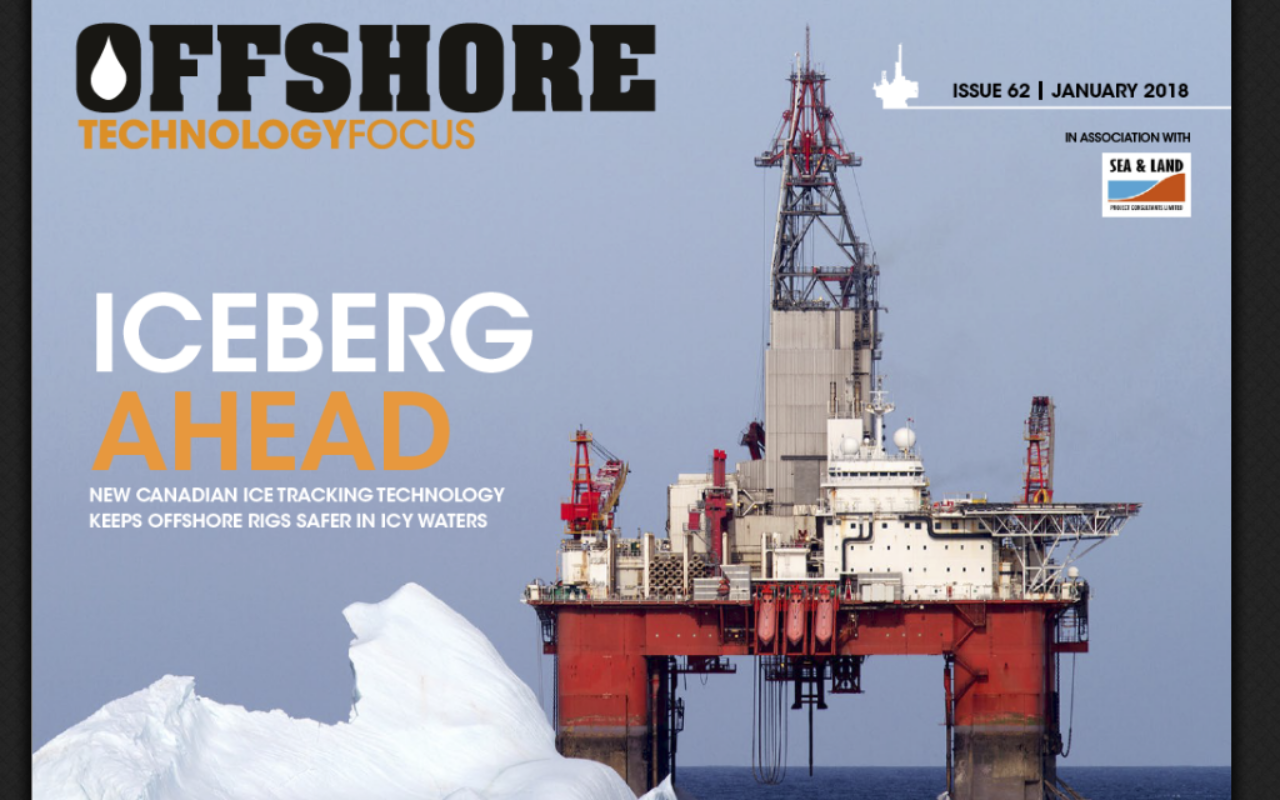
Julian Turner talks to Professor Roy Thompson about his controversial findings that suggest the UK oil and gas industries are entering their last decade of production.
Interviewee’s draft of article in Offshore Technology
(16) Dec 2017: Radio ecoshock interview on YouTube
(15) Sep 2017: The inevitable demise of UK’s offshore oil
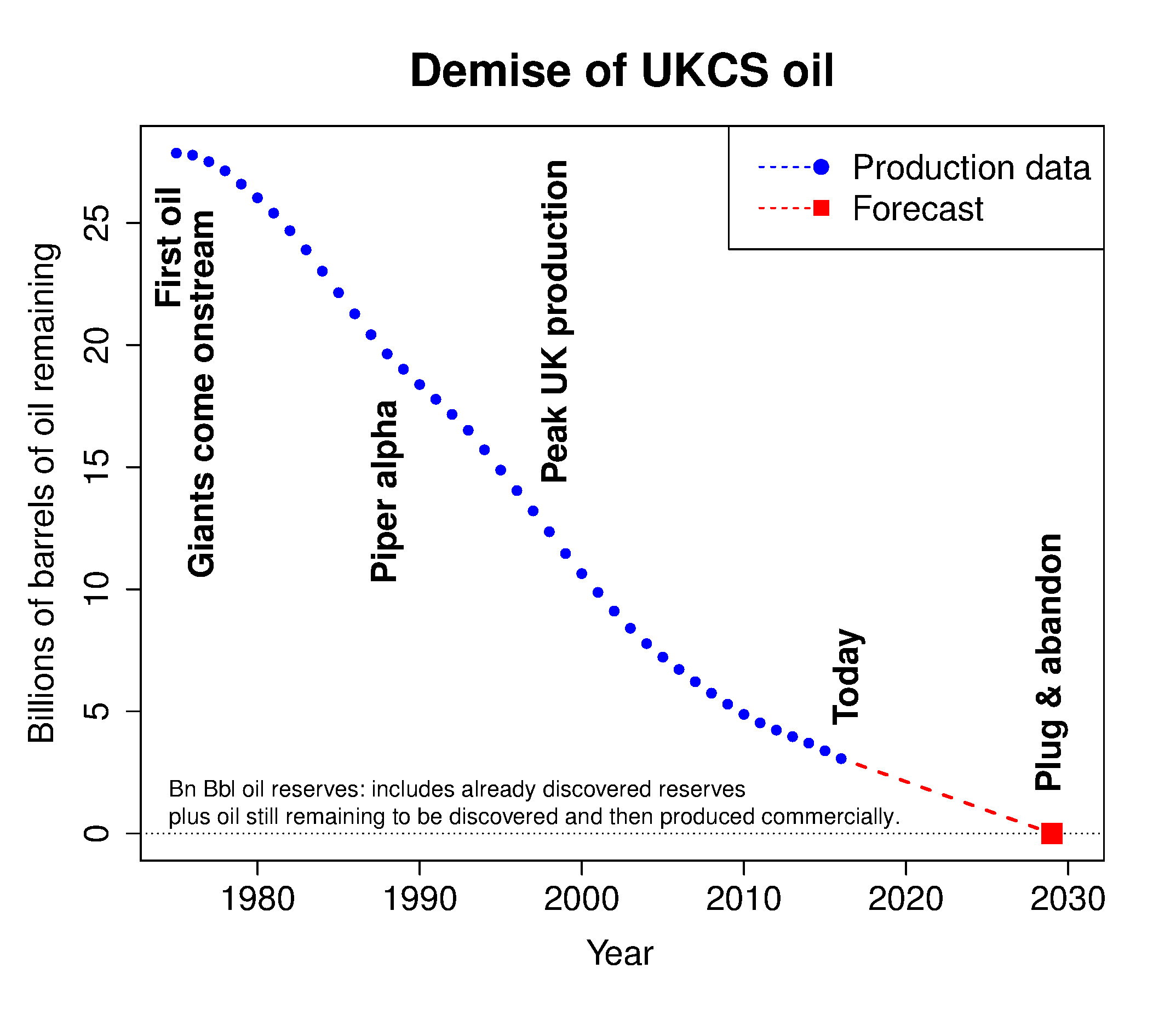
Screenshot of press coverage
.pdf of press coverage
(14) Sep 2017: UK oil and gas to last only a decade, says academic
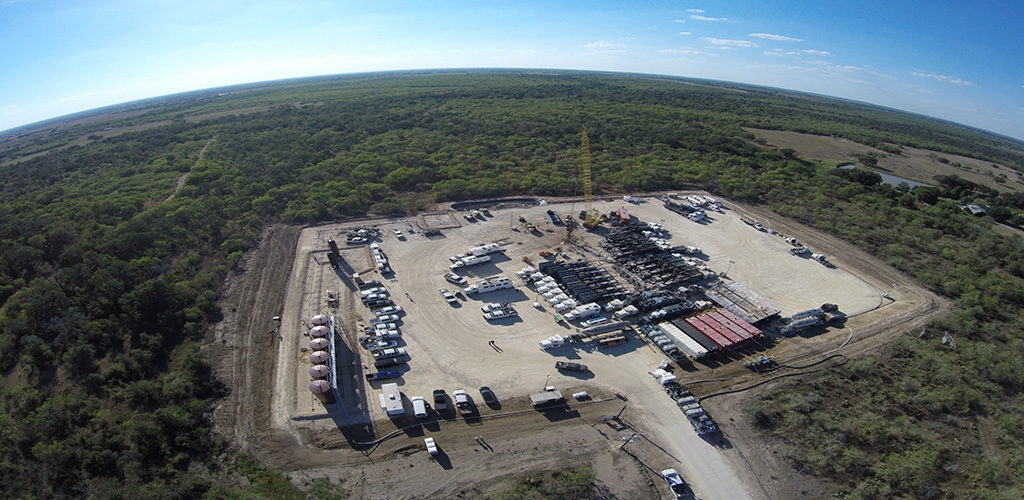
The Bobcat No. 1 well (a not untypical hydrofracking well) lies in the Eagle Ford Shale, Gonzales County, Texas. The usual array of frac pumps, blenders, water trucks, sand & chemical storage tanks, drill rig (yellow), access road and, behind, an unroofed waste-flowback pond can be seen. Production came onstream in Oct 2015, to great fanfare, but rapidly collapsed, falling by over 90% in the first 16 months. [Photo: Battlecat Oil & Gas]
- A study of production decline in our offshore oil and gas fields shows the industry is entering its final decade.
- Of the UK’s original recoverable resource only about 11% percent of oil and 9% of gas remains.
- Our oil and gas reserves will run out within 10-20 years.
- UK geology matches poorly with that of US and Canadian gas-shale plays.
- Fracking for gas will be barely economically feasible in the UK, because of a lack of sites with suitable geology.
- Even if fracking in the UK turns out to be acceptable, recovery is likely to be minimal.
- In order to emulate the UK’s energy recovery, from the North Sea oil boom years, the UK would need over 200 thousand shale-gas wells.
UK oil and gas reserves may last only a decade (News release)
Can fracking power the Scottish economy? (Additional notes)
Author’s copy of article ‘Can fracking power the Scottish economy?’
(13) Feb 2017: The State of the Nation – The truth about fracking in Scotland
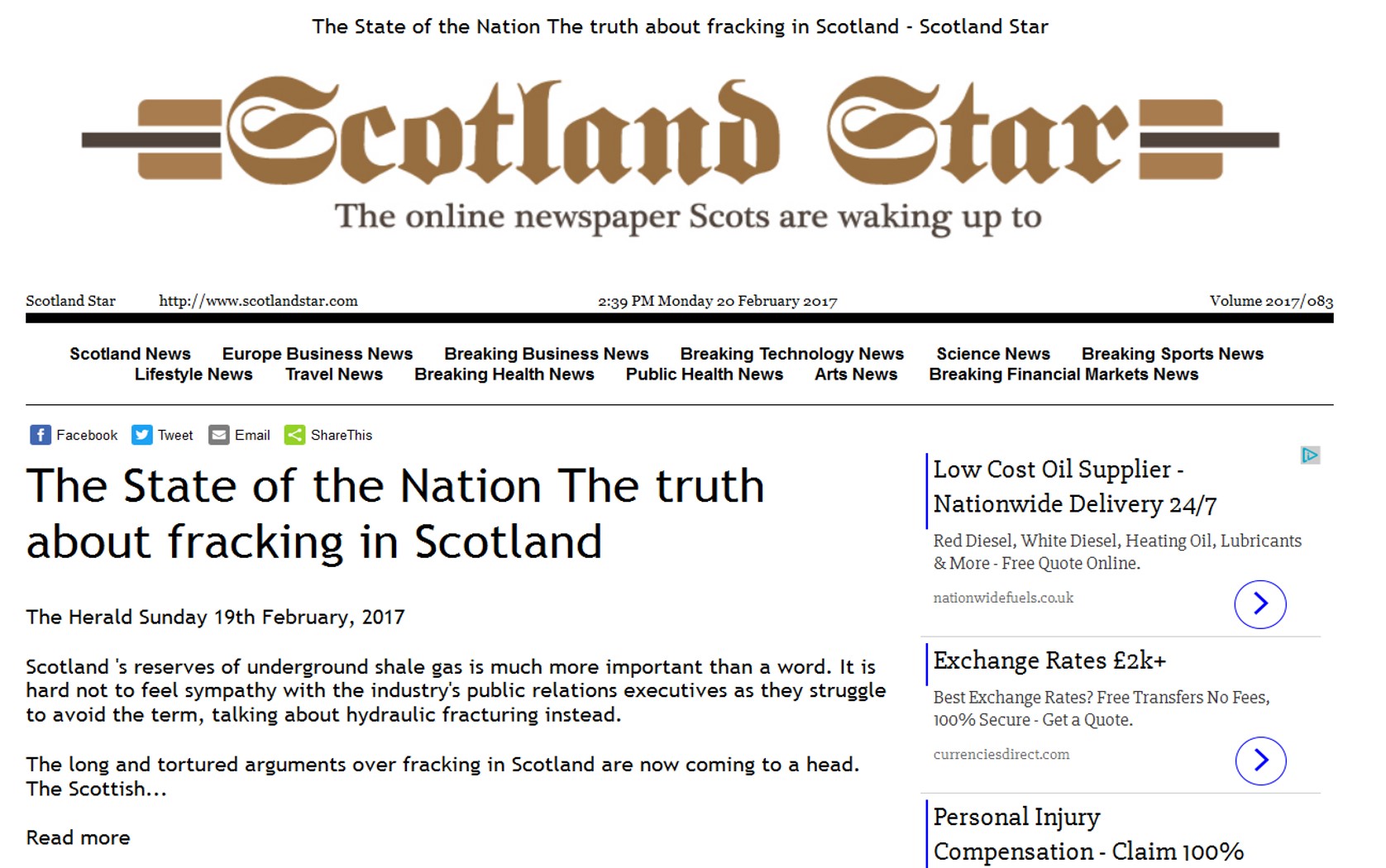
Quotes from news article in The Sunday Herald 19-Feb-2017
(12) Feb 2017: Scotland’s geology will not allow for successful fracking, says academic
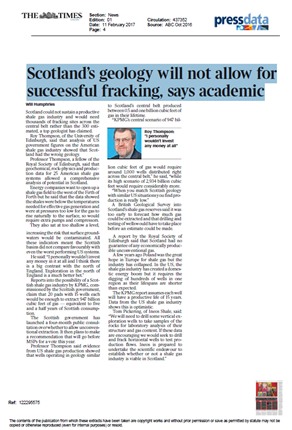
Article in The Times 11-Feb-2017
Letter to The Times 09-Feb-2017
(11) Feb 2017: Can fracking power Scotland?
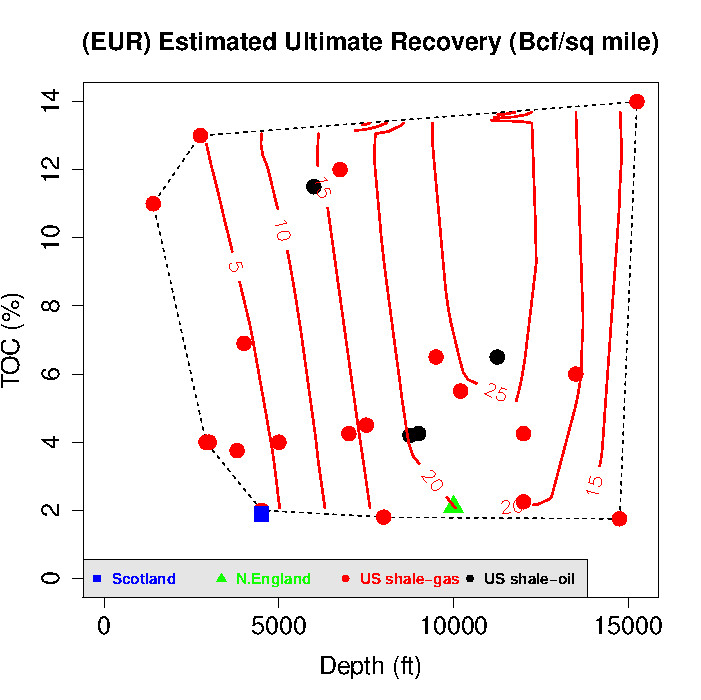
Gas-production in 25 major US shale-basins [Thompson, Edinburgh Geologist, Autumn 2017].
Recently comprehensive geochemical, rock-physics and production data for 25 American shale-gas systems has been made available, thereby allowing a simple (regression-based) geostatistical analysis of gas-production to be made. Scottish shales are found to be so shallow, thermally immature and heavily faulted that, when all three indicators are taken into account, the Scottish basins do not compare favourably with even the lowest-yielding US systems.
(10) November 2016: Whither climate change post-Paris?
Roy’s recent work suggests that solving the global climate-economics conundrum may be more difficult than previously thought.
The conundrum to be faced by world governments at their upcoming Climate Change Conference, this month at Marrakech, is how to secure additional energy supplies quickly and at minimum cost while at the same time acting in an environmentally friendly way by checking the growth of Anthropogenic greenhouse gas emissions.
The research reinforces the unpalatable finding that in the absence of even stronger carbon-pricing policies, temperatures and sea-level are set, this century, to rise considerably beyond what are currently deemed to be ‘dangerous’ levels.
![opt [opt]](https://www.geos.ed.ac.uk/~thompson/assets/Blog/opt.png)
The work concludes that the British economist Arthur Pigou came up with the policy instrument of choice for dealing with market failures, such as excessive fossil-fuel emissions, decades ago.
An attractive modern variant of Pigou’s corrective measure is the ‘feebate’, whereby any carbon tax revenues are returned directly to taxpayers. People would respond by changing their behaviour: buyers by reducing their consumption, sellers by striving to improve their product or to lower their costs.
Thus the modified Pigouvian strategy provides an incentive for companies to create novel, cleaner, greener technologies.
Such a system was introduced in the Canadian province of British Columbia in 2008 and has proved to be a great success.
![Pigou [Pigou]](https://www.geos.ed.ac.uk/~thompson/assets/Blog/Pigou1.jpg)
Arthur Cecil Pigou (18 November 1877 – 7 March 1959)
Related Links
Win-win-win
Thompson, R. Whither climate change post-Paris? Anthropocene Review first published on October 31, 2016 as doi:10.1177/2053019616676607
Short summary of paper in Anthropocene Review
Press Release
Author’s pre-publication copy
Author’s copy made available through Edinburgh University’s open access site – Edinburgh Research Explorer.
(9) October 2016: Quo tendimus post Parisius?
The Paris Agreement, negotiated by 195 countries plus the European Union, was formally adopted on Dec 12 2015. Over 34,000 words, with 1,600 bracketed passages, had been successfully resolved by the 21st session of the Conference of the Parties (COP21). Almost one year later – in the lead up to Marrakesh (COP22) – what are we to make of the Paris Agreement?
![Marrakesh [Marrakesh]](https://www.geos.ed.ac.uk/~thompson/assets/Blog/Marrakesh.jpg)
My informal evaluation of 1.2 million www search results of reactions to the Paris Agreement found a huge range of responses, even from well informed people. I find that the great majority of responses can be categorised as belonging to one of five groups.
- First, Lord Stern, Coca-Cola, former vice-President Al Gore, the Sierra Club, Nobel Prize-winning economists, over 150 heads of state, Robert Stavins (Professor of Business and Government, Harvard Kennedy School), numerous representatives of big business and a phalanx of battle-hardened, highly knowledgeable environmentalists all rank the agreement as a seminal turning point in the world’s fight against climate change. Despite the remaining challenges they applaud the global community for speaking with one voice, for signalling that the fossil-fuel era is on its way out, thereby giving greater certainty to investors (in renewables) and consequently enabling new business opportunities.
- A 2nd grouping includes legal practitioners such as Dan Bodansky (Prof. of Law, Arizona State) and Eija-Riitta Korhola, European legislator and climate policy researcher (Korhola, 2015). This group is acutely concerned about how legally binding the Paris Agreement will turn out to be. They worry that it is aspirational and so does not establish enforceable constraints that point a clear path to effective emission reductions. The grim reality is that the great majority of previous international treaties (environmental and otherwise) have proven depressingly difficult to implement and enforce (Finus, 2004; Barrett, 2003). Over-ambitious targets, debilitating free-loading temptations and non-compliance on account of asymmetries, second thoughts and changing political dynamics have plagued the landscape.
- A 3rd large group roundly applaud the Agreement as a good foundation for meaningful progress. Although many consider the real test will only come when countries have reported on what they achieved during their first 5-year commitment period. Nevertheless, for the moment, this group is content to accept the Paris Agreement as a step in the right direction. My feeling is that the majority of well-informed, science-based commentators fall into this 3rd grouping, along with Shell, ExxonMobil and yet more Nobel Prize winning economists.
- A small, but diverse 4th group worries that the targets are totally unfeasible. James Hansen (formerly NASA Goddard & tireless climate campaigner), Bjorn Lomborg (sceptical environmentalist), the MIT environment and climate outlook group, and Kevin Trenberth (NCAR) are included in their numbers. Other specific concerns (especially of Hansen) are that there are no sanctions for missing targets, there are no actions just promises, and that the inertia attached to both energy infrastructure and to the oceans has been ignored.
- Lastly a 5th group has major concerns that the Paris package will be phenomenally expensive, that business will suffer, and often that the underpinning science is wrong or at best irrelevant. Members of this group include the usual suspects: the major Republican candidates for the US presidency, long-standing pressure groups and contributors to climate-denial blogs, but interestingly NOT the major European-based oil and gas companies, nor Alberta (the Texas of Canada) with its tar-sands interests.
After reviewing this wide range of opinions and running a suite of climate-economic model calculations my view is that while it would be naïve to expect the Paris Agreement to be a miraculous cure for all the maladies arising from global warming (see Savaresi, 2016), I nevertheless find the Paris stratagems to be distinctly sub-optimal on account of the lack of a strong carbon-pricing policy. The Paris Agreement is likely to turn out to be ineffectual and unfit for purpose, especially if historical aerosol emissions are found to have been serving to mask a high climate sensitivity.
(8) May 2016: You Just Lived Through the Hottest February, March and April on Record
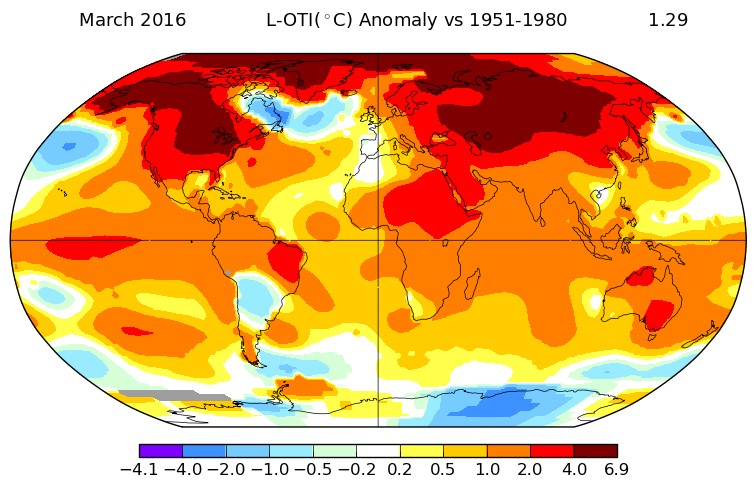
March 2016. Surface temperature anomalies. Via NASA.
This year, for the first time, a summer short course will be held on “Winning the Climate Change Battle” as run by the Centre for Open Learning (formerly OLL) at Edinburgh University. Join us and learn about the recent record breaking temperatures, discover why the Arctic in particular has been so hot, calculate your own carbon footprint, debate why so many sceptics still doubt climate change, and analyse the ways in which science can fix global warming.
Related Links
Course details: short-courses-summer-2016
March temperature map generated at: NASA maps
(7) Dec 2015: Paris aftermath

Paris climate conference
How, as calculated using climate system models, do the Paris climate conference commitments to limiting temperatures to a 1.5o C rise relate to the EU INDC (intended nationally determined contribution) and global INDC pledges? Paris aftermath
(6) Dec 2015: Roy Thompson on James Croll

James Croll’s pre-clearances birthplace at Little Whitefield, on Tuesday 2nd of January 1821
Roy Thompson FRSE – Professor Emeritus and Senior Honorary Professorial Fellow at the University of Edinburgh – gives a brief overview of James Croll, a 19th century Scottish scientist who, in his opinion, is “the earliest hero of climate change”.
YouTube video.
(5) Dec 2015: Roy Thompson on Climate Sensitivity
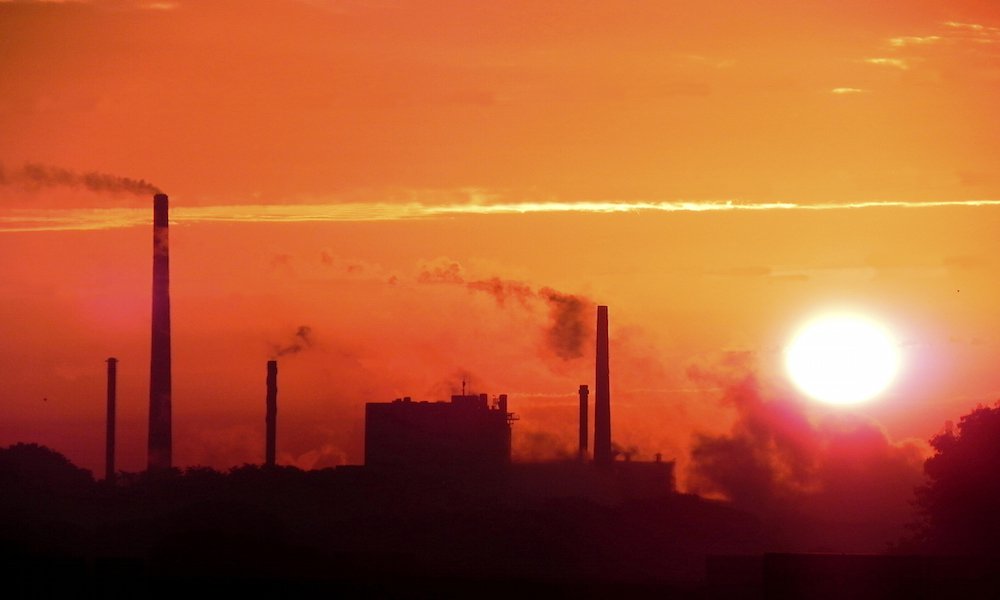
Roy has recently published a study that suggests the impact of climate change may be worse than previously thought –
land surface temperatures may rise by an average of 7.9 oC by 2100 if significant efforts are not made to counteract climate change.
Roy discusses what this means in a short YouTube video in light of the recent Paris Agreement resulting from COP21.
“While the world’s leaders continue their negotiations in Paris, attempting to iron out a deal that will limit greenhouse gas emissions and keep temperatures from rising to potentially dangerous levels, a newly published study indicates that things may be worse than we imagined” is a report on Roy’s work by RedOrbit News.
(4) Dec 2015: Climate outlook may be worse than feared, global study suggests
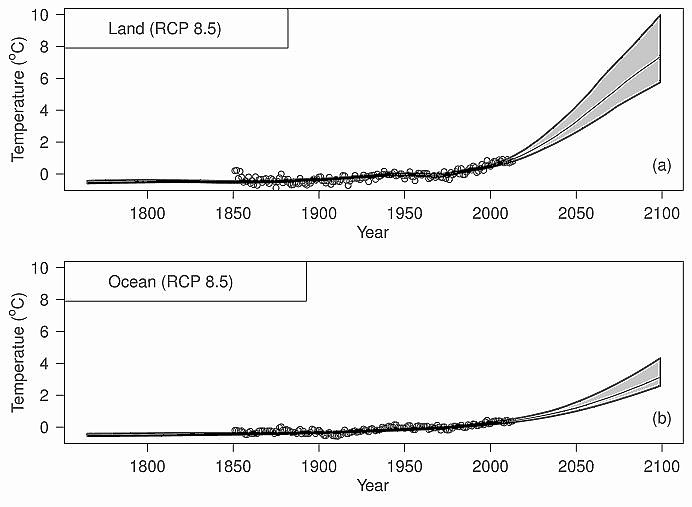
Temperature forecast to the year 2100. Based on RCP8.5 emission projections, historical land and ocean temperature records (circles) and a simple heat-balance algorithm. Note how land temperatures are predicted to rise by almost 8oC above pre-industrial, the ocean by over 3oC. Confidence regions in grey.
Expanded Press Release
Abstract and CUP Article
Author’s pre-publication copy
Author’s copy made available through Edinburgh University’s open access site – Edinburgh Research Explorer.
(3) Sept 2014: Urban sprawl

Urban sprawl: Quo Vadis Edinburgh?
(2) Aug 2014: Oil production, Piper Alpha and Independence
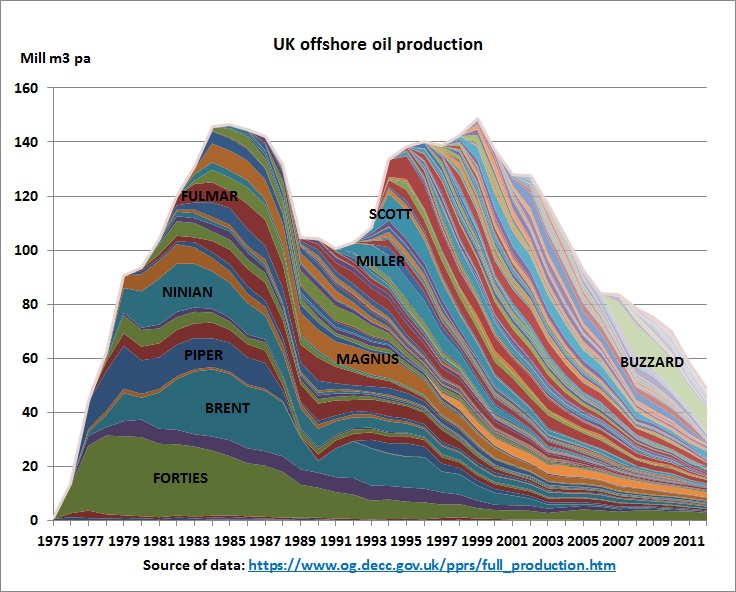
Expanded version of Letter to the Scotsman
Letter sent to the Scotsman
(1) 2013: Expose of fake science at RBGE
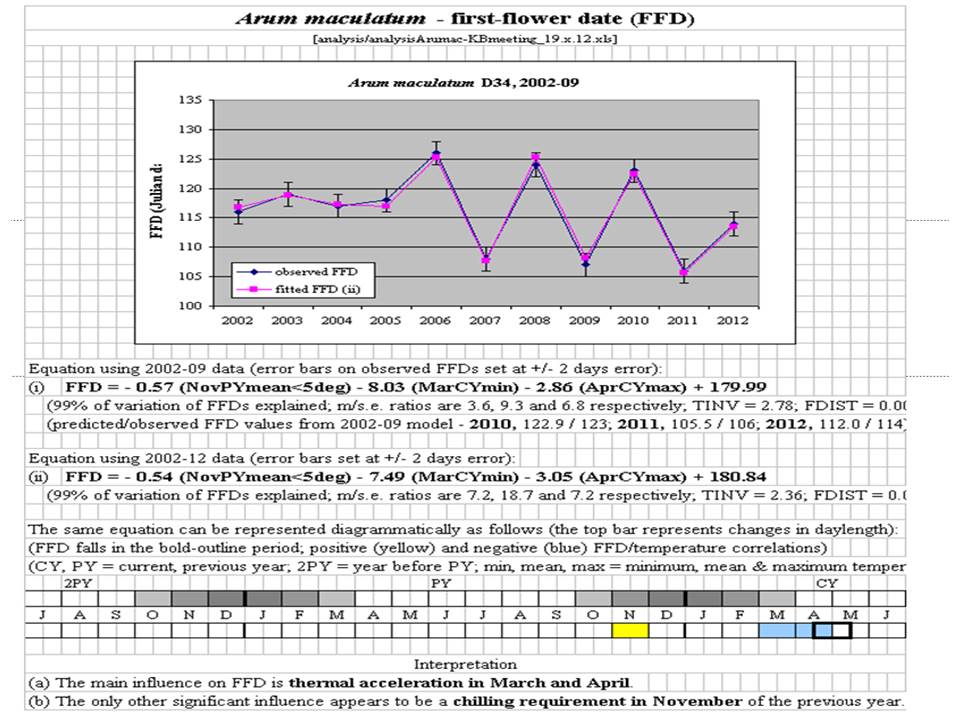


Comments are closed
Comments to this thread have been closed by the post author or by an administrator.